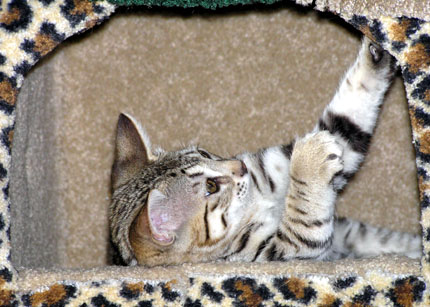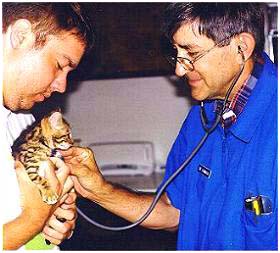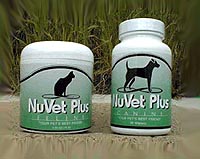
Foothill Felines Summer Spots - playful Savannah kitten.

Foothill Felines Summer Spots - playful Savannah kitten.
| (PLEASE NOTE: We are NOT veterinarians!! However, we want to share our personal research and experiences regarding these important feline health issues with other cat-lovers!! We will be updating this page often!! Send us your ideas and any comments!!) |
Ringworm (actually a fungal infection of the skin, not a worm), is one of the few infections or diseases that can affect cats and their human families. Ringworm is most commonly identified with hair loss, but additional symptoms may include scaling or crusty sores on the skin, of varying degrees, and itchiness.
Why is it called "ringworm"?? The fungi in the disease causes the cells in the skin to respond defensively to the inflammation, and since the ringworm fungi cannot survive in the new environment with the inflammation, the infection moves outward, in a ring-like pattern. In the center of the ring is the skin tissue that is trying to heal.
What makes ringworm such a highly contagious fungus?? The most common method of infection is from contact with infected hair. Because hairs, which are covered with spores, tend to remain in our environments, they remain as a key source for re-infecting animals and people. Some cats are known as carriers; that is, they do not themselves have symptoms of the disease, yet they are actually spreading the disease to others around them.
How is ringworm diagnosed?? About half the strains of the fungi will show up under a flourescent lamp, called a "Wood's Lamp". This is helpful for quick diagnosis. But to be sure, more vets are using a culture, which is collected from debris brushed from the cat's fur or suspected areas on the cat's body, and allowed to grow in a special medium under careful conditions at laboratories. These cultures, while much more accurate, can take anywhere from 1 to 3 weeks to provide results.
How do you treat ringworm?? Both the animal having the disease and any other animals and humans who come in contact with the diseased animal should be treated with anti-fungal therapy. It is also extremely important to isolate cats that have active ringworm from the others while they are being treated. If the cat's human family contains any people who are very young, very old, or are immune-suppressed, these people are at the highest risk for the complications from ringworm, and ringworm treatment must be very aggressive for the well-being of all. Most vets prefer cutting the hair on the cat away with scissors to expose the affected area for treatment, as opposed to shaving the area. Shaving seems to sometimes spread the infection, by making the fungal lesions worse.
Use an e-collar on your cat after the lime sulphur dip, to avoid vomitingDon't try using products intended for human use on your cat (such as creams for athlete's foot). They don't work, and could be highly dangerous to your cat. What does seem to work well for some breeders is lime sulfur, which was 100 percent effective after just two applications over the course of a one week treatment. Be sure your cat does not ingest the liquid before it dries, as this can cause vomiting and depression. Dipping the cat in a lime sulphur solution provided by your vet, every 4-6 days, is an important part of the treatment. Each cat in the same room or who has had proximity to the cat with the active ringworm symptoms should be dipped. It is best to put an e-collar on your cat to keep them from licking themselves while the lime sulphur dip dries, which usually takes about 3 hours. If the cat does ingest some of the dip solution, it is not fatal, but can lead to vomiting. Applying a topical solution of Miconosol (Miconazole Nitrate) directly to the affected areas on the cat once daily is also part of an aggressive treatment plan. Be sure to use disposable gloves when treating your cats. Some vets will recommend systemic treatment in addition to the topical lime sulfur. The oral antifungal agents most commonly used are "Fulvacin" or Sporanox (Itraconazole), given once a day with a fatty meal for 30 days; however, beware of giving these oral meds to pregnant queens, as they have been known to cause birth defects.
Should you vaccinate against ringworm?? The vaccination for ringworm was licensed in March 1994, and it is called FEL-O-VAX MC-K RINGWORM VACCINE. The cat needs to be extremely healthy to receive the vaccine, and it is usually only recommended for high-risk animals. It works by stimulating the cat's own immune system to fight off the ringworm infection. The vaccine is given in a series of 3 injections, the second injection being given 2 weeks after the first, and the third and last injection being given 3-4 weeks after the second. This vaccine only works at the skin level of the animal, not on hair shaft spores, so it is most effective when used with other treatments. This vaccine is a "killed" vaccine, and cannot itself cause the disease, but because of the way it works, it may make the lesions worse before they get better. This is because the cat's immune system will react with an inflammatory response to fight off the infection.
Consult your veterinarian!! Believe it or not, one of the most effective ways for you to get rid of ringworm in your environment is by vigorous daily cleaning of all surfaces in your home with a 1:10 bleach dilution solution, and intensive vacuuming daily (and discarding the bag afterwards). Your best plan of action will need to be getting your veterinarian involved immediately, and working diligently with them to get this problem under control by scrupulously cleaning the environment, and medicating all affected cats. There are several respected studies out now that show the animal prescription medication "Program(tm)" is very effective as a preventative for ringworm. It is a very safe medication, even for pregnant and nursing cats, when given once per month at the manufacturer recommended dose level. Some studies have shown increased effectiveness when used once every 2 weeks for several months. Consult your veterinarian about adding this medication as part of your total ringworm treatment plan; not as a cure for ringworm, but to help prevent the spread of this fungus to other cats in your home or cattery. Also ask your veterinarian about the new testing methods available using a toothbrush for after you've been treating your cat(s) for several months. These important lab tests will help to determine whether or not the cat still has the fungus, and/or has become a ringworm carrier.
CLICK ON KITTY to go back to beginning of Bengal Health Corner!



~ Give your kitty the energy, great health and desire to enjoy life to the fullest! Used and recommended by Foothill Felines, click on image above to order this uniquely powerful nutritional supplement for felines at our Foothill Felines breeder discount. Just a pinch a day, sprinkled onto wet and/or dry food, energizes and supports all ages, weights and breeds of cats. Developed by scientists, veterinarians and formulators to enhance the health and lives of cats, this unique Nu- Vet supplement contains many important minerals, antioxidants, enzymes and vitamins especially needed by active felines' metabolisms INCLUDING taurine, calcium, blue green algae, brewer's yeast, and much more.
FELIWAY PLUG-INS & SPRAY
~ Click on links above for more information and to order these exceptionally calming Feliway products for felines. Used and recommended by Foothill Felines! Wonderful for cats of all ages, weights, and breeds. Contains natural cat pheromones for extremely effective stress relief and eliminating need for cats and kittens to mark or exhibit other unwanted behaviors. Every multi-cat household should know about these plug-ins; they are odorless to people, yet they are especially helpful to kittens/cats during a move, any change in your household routine, periods of stress of any kind, and queening.
|
 |
~ Click on image above to learn about the incredible new exercise wheels for cats; the Toy-Go-Round wheels!! They're simply the best designed, best built and best priced wheels we've found anywhere!! |
 | © 1996-2009 Copyright
by HDW Enterprises, Inc. - All Rights Reserved. 
HDW Enterprises, Inc., Cameron Park, CA 95682 (530) 672-CATZ phone http://www.hdw-inc.com E-mail: holly@hdw-inc.com |